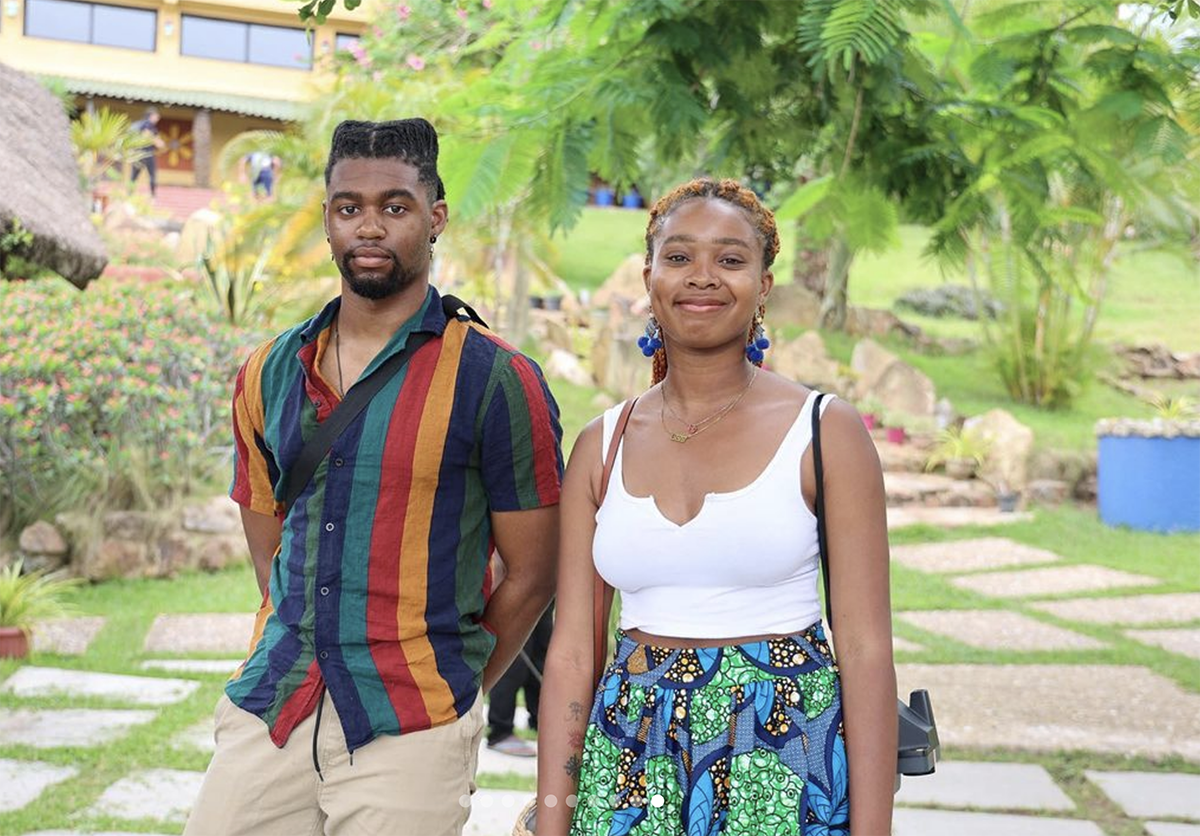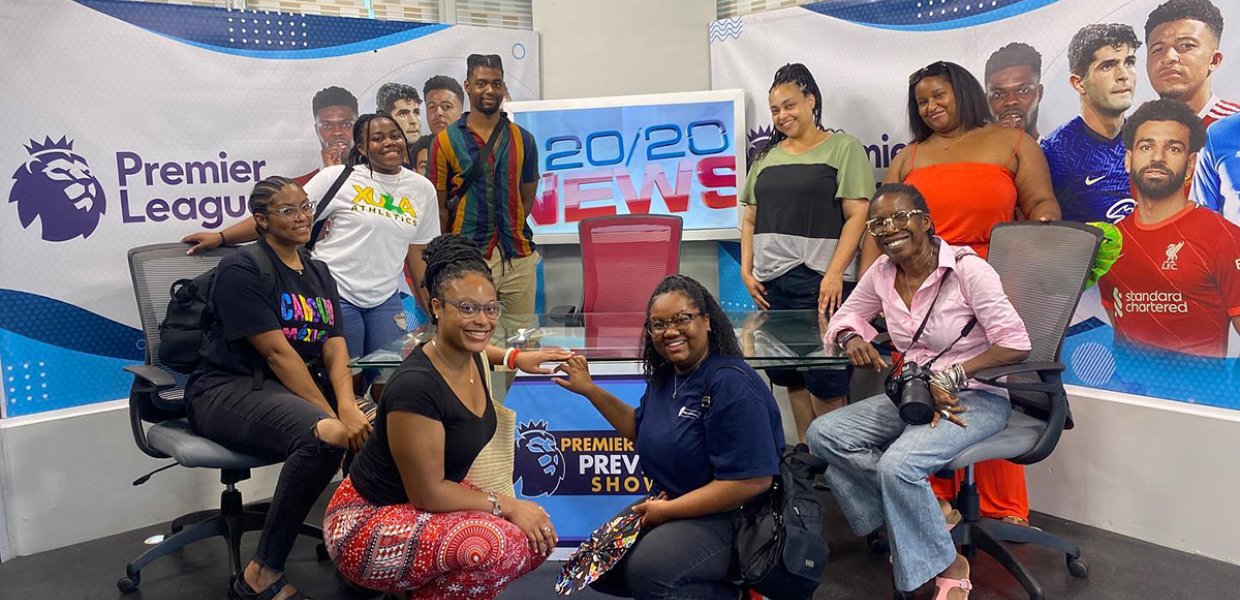“Hi. I’m Miki Turner from the University of Southern California in Los Angeles. And you are listening to Asaase Radio.”
Recording a station identification as part of a visit to the popular radio outlet in Ghana, Turner was joined by senior journalism major Reagan Griffin, Jr., and recent specialized journalism master’s graduate Gabrielle Chenault.
They spent 10 days in Ghana laying the foundation for what will be JOUR 499: Ghana Immersive Reporting Project. As part of the course, students will have the opportunity to intern at local news outlets, such as Asaase, and to report on the country’s evolution and global cultural significance.
“Ghana’s role in the slave trade, its complicated political landscape, its culture and its current initiative provide a plethora of reporting opportunities,” said Turner, associate professor of professional practice. “Our students will no doubt become more informed journalists as they develop a broader perspective on covering the global intersection of race, culture and politics.”
Initially conceived by Turner and Professor of Journalism Afua Hirsch two years ago, the course’s launch was delayed by the COVID-19 pandemic. With this trip, Turner aimed to re-establish connections with industry and academe contacts, including Citi TV Ghana, the Ghana Institute of Journalism, the Daily Graphic Newspaper and the University of Ghana. Turner, Griffin and Chenault were also joined on the trip by students from Xavier University of Louisiana.
“With everything in place for a 2023 Maymester, Professor Hirsch and I can’t wait to take our students back to Ghana for what will undoubtedly be a unique learning experience,” Turner said.
Turner added that for Griffin and Chenault this was an especially powerful experience, and here they both share their reflections.

They don’t tell us about Nkrumah
By Reagan Griffin, Jr. (BA, journalism, ’23)
“What do you know about Kwame Nkrumah?”
The University of Ghana professor’s question stumped me. Truth be told, at that point in time Kwame Nkrumah was just a name to me — a name that I’d seen floated around in regard to socialism and Pan-Africanist philosophy and a name that I’d seen on street signs in Ghana, but a name nonetheless. I’ll venture to say that I’m not the only one in this camp — the American education system is one that will ensure that you are indoctrinated with the star-spangled spirit of Paul Revere and Betsy Ross far before you are informed of any African history. If you are a Black American, as far as our collective conscious is concerned your story starts on the boats.
But our heritage is far richer than what we are informed — as the first person in my family to touch African soil since my ancestors were stolen, I’ve seen it with my own eyes and heard it from the mouths of those who have been proximate to the continent. While popular media will lead one to believe that Africa is a land defined by poverty, war, corruption and sorrow, what I witnessed was a vibrant and beautiful society rooted in rich cultural tradition and powerful camaraderie.
As I read, listened, and asked about the legacy of the great Kwame Nkrumah, I found that this is a power that he sought to mobilize, to the benefit of African people across the world. The first prime minister of an independent African country, free of western colonialization, Nkrumah understood that the struggle for Black liberation was a global one. Ghana’s independence, in his mind, was not the finish line, but rather a step toward a larger objective: the unification of all African nations and people under one independent state.
Because of western influence that led to a coup d’état, Nkrumah never saw his goals come to fruition. However, in his short time in power, the advancements that he was able to catalyze in education, healthcare, public infrastructure, and industrialization prove that his ideas were not without merit. And if you ask the people of Ghana, they’ll tell you that if he’d had more time in power, African people everywhere would be better for it. Oftentimes we think about African liberation in the context of the way Black people are perceived and treated — and while these things certainly hold merit, the real travesty of the Black plight exists within our lack of access to material resources, many of which come from the continent we are born from and are extrapolated from our labor. Kwame Nkrumah fought to change these conditions and regain control of the rightful share of the means of production for African people everywhere.
As we celebrate Juneteenth and the freedom of African people in America, it is my hope that Black people (for whom this holiday is celebrated, by the way — it feels like some of y’all forget that) take some time to reflect upon our place in the context of a struggle that takes place not just in America, but across the world. It is a worthwhile endeavor, one that all the great African revolutionaries — from King to X to Davis to Du Bois to Garvey to Mandela to Shakur and beyond — undertook at some point in their journey. Unfortunately, not all of us will have the privilege to touch the African continent in our lives — however, it is imperative that we inform ourselves and each other of our history and the ways in which we’ve fought for our liberation.
Because they don’t tell us about Nkrumah.
Welcomed with open arms
By Gabrielle Chenault (MA, specialized journalism, ’22)
The trip to Ghana truly opened my eyes to what it means to unite the diaspora and be an effective journalist. I had been to the African continent several times but never experienced anything like what we witnessed on the 10-day trip in May.
As an African American, although we have safe spaces in our country, I still often felt othered in general society. It gets incredibly tiring having to over-explain yourself and your existence. As soon as I stepped off the plane in Accra, I just felt an overwhelming sense of peace and comfort which continued over the course of the trip.
Interacting with media outlets such as Asaase Radio, City TV and the Daily Graphic introduced me to a new way of doing journalism. I loved how their companies work in a for-us-by-us format. They are truly there to serve and educate the people and teach others how they can do the same.
I loved how the people of this beautiful country constantly welcomed others with open arms. It didn’t matter if you weren’t from Ghana or even West Africa, they constantly greeted us with welcome home. To be welcomed in a space where your ancestors could have possibly lived and thrived was life changing for me because it’s rare as African Americans to truly feel accepted and seen by society.
Throughout our excursions we not only learned more about Ghanaian history but also about how the diaspora plays such a big role in the overall fabric of Ghana. Visiting Elmena, the Black Star Gate, and just driving around the country and seeing people who look and speak like you impacted me into looking for journalism jobs outside the U.S.
Ghana was a life-changing trip for me and I am so honored that I was able to go and experience the beautiful country. Not only did I learn a lot about journalism in their country but I learned more about how I can be an effective journalist to truly enact change in the communities I report in. My hope is that other USC students can go and experience the same.
